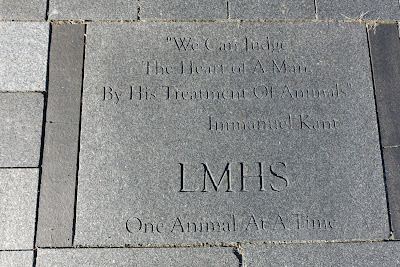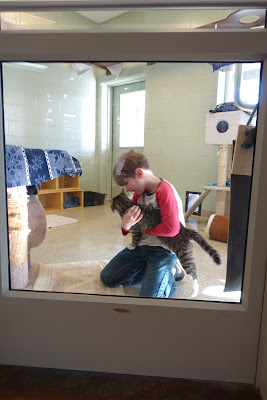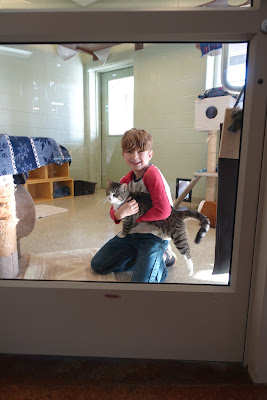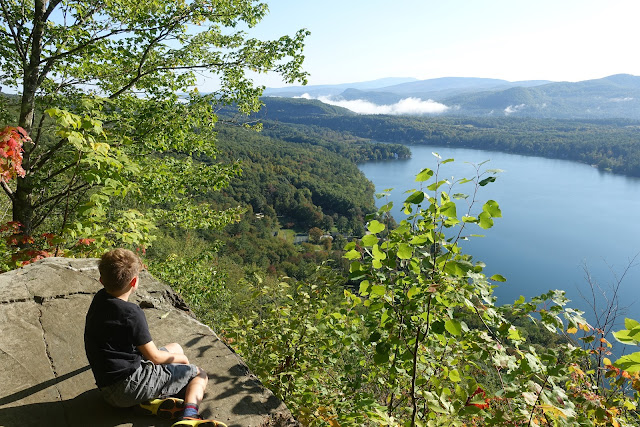I've always loved the tiny library just down the road from us. The librarian, Ms. L, has known W since before he could walk, and often when we walk in she has a new book saved out for us that she thought we might want to check out. If I ask about a particular book she doesn't have, one way or another she'll have it there the next time we are in. She leaves phone messages telling us about upcoming library events. At the library, my kids have played with kittens, planted seeds, decorated gingerbread houses, carved pumpkins, tried playing a harp, and attended concerts. The library was the first way we felt a part of the community, before the kids were the age for school or sports or lessons. Ms. L has been her usual helpful self now that we are homeschooling. She has always let us be pretty loose with our due dates but knowing that we are using our books for school now, she's taken to digitally renewing them for me, so I don't even receive the automated "books due soon" or "overdue" emails that I used to. Right now I am reading a book called
The Brave Learner solely because she heard about it and purchased it with me in mind. (It's nice to feel special!) Ms. L is also the one who connected me with a homeschool parent who recently moved to our town and whom we've gotten together with a few times.
And yet our library is very small and its stores are limited. Before our homeschool year began, I was worried about having access to enough of the right kinds of books at the right times. I wanted to have books to go with topics we were studying in the content areas. And to teach reading itself, I wanted to have a lot of a given type of book for 6 or 8 weeks while we worked on strategies to read and understand that type of text and while I gave W big periods of time to read independently and put those skills to practice. The first set of reading skills we focused on this year was fiction in general, and for that I probably could have been satisfied at our library, but I knew later in the year I wanted to have, for just as long, a selection of books on the American Revolution, and later a bunch of historical fiction, and later a plethora of different biographies, and eventually poetry anthologies... I wanted to have enough of each of these categories not only to supply a voracious reader, but to offer him with choices and the ability to make comparisons at any given time. I knew I'd want to be able to keep most of these books longer than the typical two-week library loan time. I considered buying some of the great books I'd researched and felt I had to have. I made a wish list of titles for our studies across the year. I tried contacting companies like Heinemann to see if I could get a big discount on some sets of books for use in a homeschool setting, since the book lists they offer are excellent but the quantities and prices are intended for entire classrooms. I even asked the area sales rep if there were used books in certain categories that we could borrow. (The answers to both were no.) I knew I could buy some books through Kindle, or find some things through Epic or Reading A-Z which were sites with online kids' books I had access to. But I still wanted a lot of actual books.
Well, my fretting was for naught because I haven't bought any books and it has all worked out beautifully so far due to not one but a combination of local libraries, which deserve a special shout out. Besides our favorite little library, we also have free library cards at three other local libraries and the public school library. All these places are helpful, and by using some books from all of them, I have been able to find, if not every specific title I had in mind, plenty of books on any particular subject or genre that we have needed. We renew them as many times as we can (which is, depending on the library, anywhere from over a month to indefinitely) and that allows us to have things around as long as we need. I am often checking due dates and sorting out which books need to be returned where, but it's well worth it for all the free resources we use.
Another way I've been getting the resources we need is with free trials. What a fabulous concept! I have a free trial on
Newsela, which is a great source for research content in general and kid-appropriate news and current events. You can even click to adjust the reading level of most articles. (I probably shouldn't say anything, but I've been using Newsela for free for a lot longer than the 30 days the trial was supposed to be.) I currently have a free trial to
Freedom Flix, through Scholastic, which has provided some great online texts on the American Revolution while we're learning about that. I got a lot out of
Mystery Science for free for a while but eventually paid for it ($69 for the year) because I wanted a feature that it wasn't allowing access to without doing so. (I appreciated that they offered a reasonable price for homeschoolers which was less than the regular classroom price, as I've found that too many great educational resources don't seem to consider, in their cost or otherwise, that homeschool families also might want to use them.) I had a free 30-day trial of
Audible, which I've since cancelled because I didn't want the monthly fee, but that free month was great and allowed us to listen to some books not available through the library, which leads me...
Back to celebrating libraries to mention one more awesome feature: online audio books. Maybe this is old news to everyone else, but I thought it was amazing when I discovered this year that, simply by having a NH library card, I could check out
audio books online using an app ("Libby") and listen to them through Bluetooth in the car. Having these audio books on hand helped us make the long journeys to Nova Scotia in August and Washington, D.C. in October, and it's been a game changer for our daily 25-minutes-each-way drives to M's preschool. M is not a huge fan of audio books yet (at least of the novels W wants to listen to) so we usually spend the drive over there in the morning when it's all three of us singing songs, talking, or playing games. But after dropping her off, we listen to an audio book on the way home; we do the opposite in the afternoon when we pick her up. Besides helping W to actually look forward to the time in the car, this has allowed us to read so many more books. And what's really nice that it provides a slew of books we have in common
to talk about. At the beginning of the year, I was startled by how difficult it was for W to discuss books. I'd ask him 4th-grade-level types of comprehension questions-- about the characters' traits or motivations, about how the character changed, how one part was important in relation to the whole book, or about theme-- and this probing could be a bit of a battle, even though we were explicitly working on strategies for thinking about all of those things. He'd insist he didn't know/he forgot/the characters could only be described as "nice"/the book had no theme or life lesson, and he'd just want to get back to reading. I sometimes wondered if he truly didn't understand books (beyond plot recall), or if it was just too hard to focus on the conversation part enough to really show he understood. Either way, he's come a looong way in this regard and it's in no small part due to the fact that we have had all these shared audio books between us to discuss. (I try to get him talking about the books he reads on his own too, and I've been known to look up online summaries and discussion questions about books I haven't read myself in order to do so, but it's much more natural and fun when it's a book we've read together.) I pause the books once in a while to ask him questions or explain vocabulary or make predictions and we discuss the bigger ideas each time we finish one.
Just the other day we had just heard the last words of
The One and Only Ivan, and while W might still prefer I immediately start the next book we've got queued up, it was completely painless for him and pretty efficient to respond fully to all the questions I brought up about it. I pointed out to him how much harder this would have felt to him a few months ago.
Here are some library books (mostly audio) I've had the pleasure of sharing with W this school year. Every parent and kid is different, but these are all ones my 9 1/2 year old and I both enjoyed. (I'm leaving out a few we've listened to that I don't particularly recommend. I am also leaving out
Harry Potter and the Goblet of Fire, which is the actual physical book we are currently reading and which no one needs me to recommend.)
Books we've Loved Lately:
Fish in a Tree: Uplifting story about a girl with dyslexia and her self esteem and how we all have strengths.
One and Only Ivan: Narrator is a gorilla, yet there is strong character development. A nice story for animal lovers.
My Side of the Mountain: Old story about a kid running away to live in the Catskill Mountains by himself. W ate up all the tough and clever survival details.
Blubber: A Judy Blume gem, so much more of a book than
Tales of a Fourth Grade Nothing (which was fine). Makes you think about the social games of upper elementary schoolers, and gives a good look at bullying from all perspectives.
Ungifted: Not the great literature that some of these other books are, but we both enjoyed this story a lot about an impulsive, always-in-trouble kid who accidentally gets sent to the gifted school and how it changes all their lives. By Gordon Korman, a prolific and accessible author who also wrote the
Dive and
Everest series we've gotten hooked on in the past.
Frindle: One of the best of Andrew Clements. I read this book as a student teacher in a fifth grade about 15 years ago and thought it was fabulous even then. About language, flouting authority, and the power of ideas.
Little House in the Big Woods: Very optimistic family story that is practically a manual of 19th century living in sections (how they made cheese, trading, sewing, hunting, cleaning the gun...).
Little House on the Prairie: More of the same, but as the family moves west the interesting bits about the biases and fears about "Indians" led to good conversations.
The Black Stallion: A beautiful story about a boy and a horse who save each other and it all works out in the end.
Love that Dog: Read some poetry first so kids have some background knowledge. Lots of cool references to famous poems as a kid works his way through learning how to write poetry without realizing he's doing it. Quick read.
Henry and Beezus: We loved the entire Ramona series a few years ago. The Henry books now are easy reads and it's fun to revisit the same characters through Henry's perspective. Henry is his own unique, earnest, do-the-right-thing kind of guy.
First Light: Complicated, cool book that is part fantasy and revolves around the impacts of global warming.
The Lemonade War: Well-written realistic fiction about a brother and sister and a competition. The sister is high functioning on the autism spectrum and her character gives some insight into how people like that can have difficulty reading emotions and interacting with others.
Wonder: A kid with a deformed face goes to public school for the first time. Given that, it's surprisingly upbeat and sweet.
The Tiger Rising: Sad in parts but uplifting overall, a super rich book by a great author with lots of symbolism and repeated imagery.





































